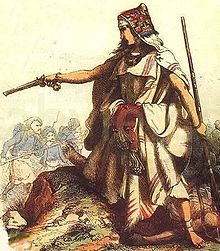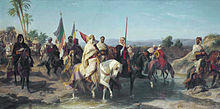Lalla Fatma N'Soumer
hideThis article has multiple issues. Please help or discuss these issues on the talk page. (Learn how and when to remove these template messages)
|
Lalla Fatma N'Soumer | |
|---|---|
Faḍma n Sumer (Kabyle) | |
 | |
| Born | c. 1830 Werja, Abi Youcef |
| Died | c. 1863 (aged 32–33) |
| Known for | Maraboutic resistance fighter against the French conquest of Algeria |
| History of Algeria |
|---|
 |
Lalla Fatma N'Soumer (Kabyle: Lalla Faḍma n Sumer; c.1830 – c. 1863) was an important figure of the Algerian resistance movement during the first years of the French colonial invasion of Algeria. She was seen as the embodiment of the struggle and is an Algerian national hero.
Lalla, the female equivalent of the Berber word mass, is an honorific reserved for women of high rank, or who are venerated as saints.
From 1854 after the death of Sherif Boubaghla until 1857, she took command of the anti-French resistance and defeated the French under Marshal Randon several times, notably in the Battle of Tachekkirt.[1][2] After she had defeated Marshal Randon the French asked for a ceasefire which she agreed to, however in 1857 the French violated the ceasefire and launched a surprise attack on Eid al-Fitr which led to her capture.[1][2] Once captured by French forces, she was imprisoned until her death six years later. Her disciples would believe that she was gifted powers by God, including the abilities to see the future and cure illness.[3]

Her ashes were transferred in 1994 from the cemetery of Sidi Abdellah, 100 meters from the zawiya Boumâali in Tourtatine towards the Square of the Martyrs of El Alia Cemetery.
Legacy[]
Lalla Fatma's life has been documented in the movie Fathma N'Soumer, directed by and released in 2014. The lead role of Fatma N'Soumer was played by French actress Laetitia Eido.[4] A few statues of Lalla Fatma are in display in Algeria. A few schools and streets bear her name in Algeria. She was buried in the cemetery of Sidi Abdellah
References[]
- ^ Jump up to: a b Illuminating the Darkness: Blacks and North Africans in Islam - By Habeeb Akande
- ^ Jump up to: a b Akyeampong, Emmanuel Kwaku; Jr, Professor Henry Louis Gates (2012-02-02). Dictionary of African Biography. Oxford University Press. p. 23. ISBN 978-0-19-538207-5.
- ^ "Imperialism in North Africa". Women in World History: Module 9. Center for History and New Media. Retrieved 2017-08-25.
- ^ "Fatma N'Soumer (2014)". IMDb. Retrieved 7 July 2017.
Sources[]
- Emile Carrey, Récits de Kabylie. Campagne de 1857, Paris 1858
- Adolphe Hanoteau, Poésies populaires de la Kabylie du Jurjura, Paris 1867
- Tahar Oussedik, Lalla Fadhma n'Summer, Algeri, Laphomic, 1983
- Boukhalfa Bitam, Fadhma n'Soumer. Une autre lecture du combat de l'illustre fille de Werja, Draa Ben Khedda, Aurassi, 2000
External links[]
| Wikimedia Commons has media related to Lalla Fatma N'Soumer. |
- (in French) An online biography on Algiers parliament site - (often incorrect and a bit emphatic)[citation needed]
- (in French) An article confronting information on Lalla Fadhma coming from oral and written sources
- (in French) Emile Carrey, Récits de Kabylie. Campagne de 1857, page 280.
show This article may be expanded with text translated from the corresponding article in Italian. (October 2012) Click [show] for important translation instructions. |
- 1830 births
- 1863 deaths
- African resistance to colonialism
- People from Abi Youcef
- Kabyle people
- Algerian women in politics
- Women in 19th-century warfare
- African women in war
- Berber rebels
- Deaths in Algeria
- Deaths in custody
- Prisoners of war held by France
- Algerian prisoners and detainees
- Algerian nationalism
- 19th-century Algerian women